Having lived in Taiwan since 2015, I’ve been somehow under the impression that Taipei is rather lacking in quality Mexican food. And that’s the cuisine that many American expats tell me they miss the most since burgers and pizza are readily available across the city. In addition to traditional Mexican fare, I’ve also had a serious hankering for the American-style Chipotle Mexican Grill’s “burrito bols” and salads — a staple food of my grad school days.
But apparently I just listened to the naysayers and didn’t look hard enough. Recently I discovered not just one, but two top-notch joints that satisfy my cravings for both Mexican food and its Americanized variety. Both have been around since 2016, which makes me want to kick myself for not trying earlier.
RICH AND ZESTY TRADITIONS
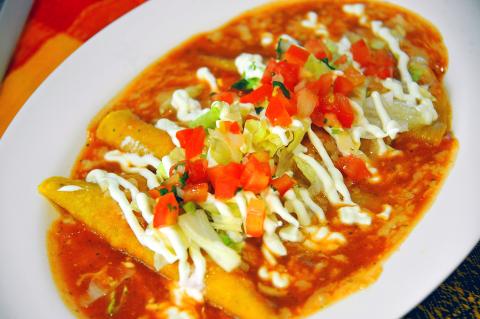
Photo: Han Cheung, Taipei Times
Teotihuacan is hidden in an alley behind the Taipei Municipal Library’s main branch, across the street from Daan Forest Park (大安森林公園). Named after the famous ancient city and pyramids near Mexico City, the restaurant serves traditional Mexican fare — without the spiciness, but the staff tells us they can turn up the heat per request. And it has vegan and vegetarian options too.
Classic and popular Mexican tunes are blaring from a speaker when we arrive, so choose your tables wisely depending on whether you want to talk to your companions. The small space has just a few tables, with the walls adorned with Mexican flags and knick-knacks.
The last time I was here I insisted on ordering the salad (NT$175) in a bid to stay healthy despite the waitress strongly recommending the nachos emperador (NT$275), so this time I give in without prompting. The nachos are loaded, coming with ground pork, pico de gallo (tomato salsa with onion and cilantro), beans, jalapeno and nacho cheese. The jalapenos are tangy but not very spicy, but they still provide a nice kick. The salsa is juicy and refreshing and the meat firm and flavorful, and all the different flavors and textures blend well. The chips were a bit salty, which was fine, but they could have been milder to let the toppings shine more. It was worth the order, although since the rest of the dishes are all pretty heavy, I’m probably sticking to the greens next time I visit.
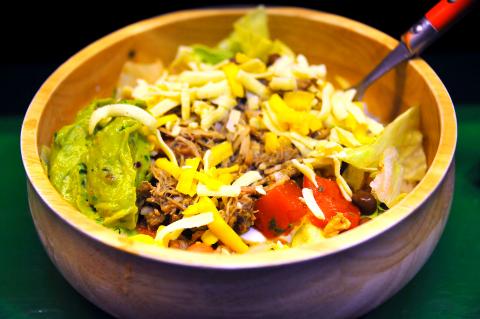
Photo: Han Cheung, Taipei Times
All the following dishes have a mild kick to them provided by the restaurant’s homemade chili sauce, which is revealed to be reduced by half in spiciness to fit the Taiwanese palette. The chicken enchiladas (NT$400) were served on top of a tomato-based sauce with cheese, topped with sour cream, salsa and lettuce. This was the richest dish of the meal, with the zesty sauce, cream and cheese melting into each other, setting a flavorful backdrop for the enchiladas, which came with corn tortillas just crunchy enough with chicken that was pretty tender for breast meat.
Each serving of tamales (NT$150), which are basically a Mexican zongzi (粽子, glutinous rice wrapped dumplings in bamboo leaves), are just enough for one person, so order more if you have a large group. Instead of rice, a mashed corn dough, or masa, is used. It’s pleasantly not too mushy, and one can still make out the grainy texture while the aroma of the leaves come through. There’s a light layer of chili sauce on the tamale, and one can experiment with the accompanying beans, pico de gallo and sour cream to make each bite different.
The chorizo quesadilla (NT$250) is cut into six pieces — perhaps check with them depending on the number of your party so it can be divided equally. Compared to the previous dishes, this one is simple, consisting of two flour tortillas grilled to a perfect crisp with melted cheese and ground sausage in between. The milder cheese pairs well with the sharp taste of the chorizo, although the meat could have been spicier. With such strong flavors, the chili sauce is largely optional, which is probably why the chef set it on the side instead of applying it directly to the food like the previous two dishes. It adds a nice kick to the quesadillas, but runs the risk of making the food taste too similar to what we’ve already consumed.
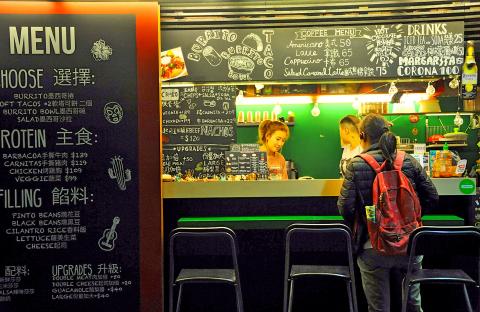
Photo: Han Cheung, Taipei Times
We did not try the desserts such as churros with chocolate sauce or flan (both NT$100), as it would probably give us heart attacks. For drinks they have margaritas (NT$250), tequila shots (NT$100), Corona (NT$150) and your standard variety of non-alcoholic drinks — but I was surprised that they don’t carry horchata, a sweet milk-like drink made from rice or nuts and vegetables that also has an alcoholic version.
NORTH OF THE BORDER
It’s easy to look at Nala’s Mexican Food as a Chipotle clone — their offerings of the same ingredients in burrito, taco, burrito bowl and salad exactly match that of the famous American chain. The choice of meat is identical too: barbacoa (beef), carnitas (pork), grilled chicken and vegetarian/vegan options.
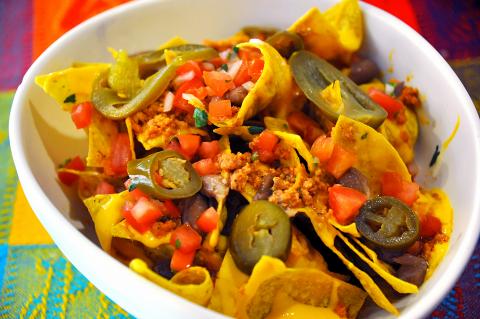
Photo: Han Cheung, Taipei Times
But the difference is that the food at Nala’s is a small-scale, home-cooking style operation compared to Chipotle’s mass production enterprise, and while also similar in taste, the ingredients do feel much fresher. If Teotihuacan was cramped, Nala’s is literally a outdoor bar-style hole in the wall with just four to five chairs, although Chiang Kai-shek Memorial Hall is nearby for a takeout picnic. Nala’s readily identifies as Tex-Mex cuisine, which is basically the variety of Mexican food that arose in Texas and spread across the US, and you probably won’t find food like this in Mexico.
I order the exact same thing I did during my Chipotle days: burrito bowl with carnitas (NT$119) which is pulled pork braised or simmered in oil. I keep forgetting to ask them to put the salsa on the side — while refreshing, I don’t like it getting the rest of the food too soggy. The spiciness of the salsa is also quite mild, but the rest of the ingredients are quite strong in taste.
The pork is tender and flavorful, marinated with spices that the staff wouldn’t reveal to me, claiming it to be the owner’s secret recipe. The biggest surprise is the guacamole (optional for NT$40), which is of the creamier variety, carrying a sharp onion and tomato taste that stops just short of overpowering the avocado. I eschewed the guacamole as a student to save money, but I’ll be adding it every time I come to Nala’s.
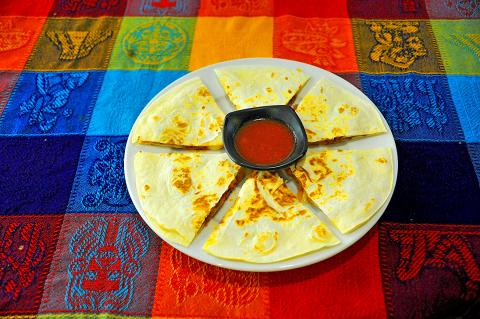
Photo: Han Cheung, Taipei Times
I’ve already visited these two eateries several times since I first discovered them, and I definitely will try more things on the menu such as Teotihuacan’s huevos rancheros, a breakfast dish with eggs, and I’m also curious about Nala’s tomato soups. And, I’ll know what to say next time someone tells me there isn’t decent Mexican or Tex-Mex food in Taiwan.
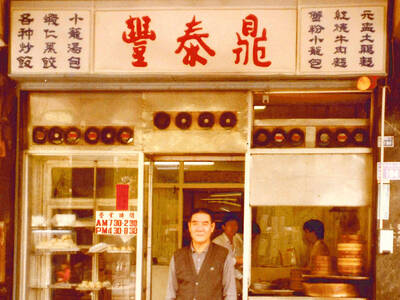
March 24 to March 30 When Yang Bing-yi (楊秉彝) needed a name for his new cooking oil shop in 1958, he first thought of honoring his previous employer, Heng Tai Fung (恆泰豐). The owner, Wang Yi-fu (王伊夫), had taken care of him over the previous 10 years, shortly after the native of Shanxi Province arrived in Taiwan in 1948 as a penniless 21 year old. His oil supplier was called Din Mei (鼎美), so he simply combined the names. Over the next decade, Yang and his wife Lai Pen-mei (賴盆妹) built up a booming business delivering oil to shops and

Indigenous Truku doctor Yuci (Bokeh Kosang), who resents his father for forcing him to learn their traditional way of life, clashes head to head in this film with his younger brother Siring (Umin Boya), who just wants to live off the land like his ancestors did. Hunter Brothers (獵人兄弟) opens with Yuci as the man of the hour as the village celebrates him getting into medical school, but then his father (Nolay Piho) wakes the brothers up in the middle of the night to go hunting. Siring is eager, but Yuci isn’t. Their mother (Ibix Buyang) begs her husband to let

The Taipei Times last week reported that the Control Yuan said it had been “left with no choice” but to ask the Constitutional Court to rule on the constitutionality of the central government budget, which left it without a budget. Lost in the outrage over the cuts to defense and to the Constitutional Court were the cuts to the Control Yuan, whose operating budget was slashed by 96 percent. It is unable even to pay its utility bills, and in the press conference it convened on the issue, said that its department directors were paying out of pocket for gasoline

On March 13 President William Lai (賴清德) gave a national security speech noting the 20th year since the passing of China’s Anti-Secession Law (反分裂國家法) in March 2005 that laid the legal groundwork for an invasion of Taiwan. That law, and other subsequent ones, are merely political theater created by the Chinese Communist Party (CCP) to have something to point to so they can claim “we have to do it, it is the law.” The president’s speech was somber and said: “By its actions, China already satisfies the definition of a ‘foreign hostile force’ as provided in the Anti-Infiltration Act, which unlike